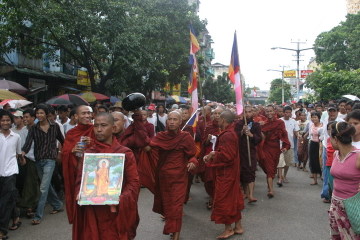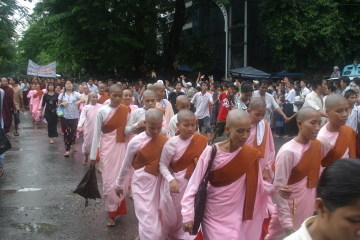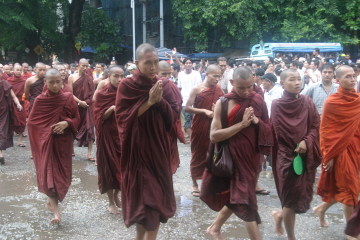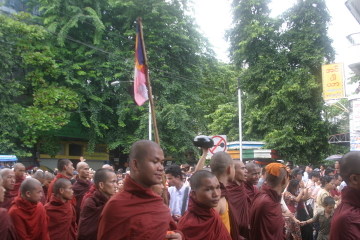Q&A: Protests in Burma
As demonstrations in Burma turn violent, Mark Tran looks at the background to the most significant challenge to the junta in decades
How serious are the protests?
After days of largely peaceful demonstrations, the military government is taking a tougher approach. It has imposed curfews and banned gatherings of more than five people. But the monks have continued to march in the streets. Burmese police have responded with baton charges and by firing tear gas and warning shots. Reports say some 7,000 demonstrators, led by 3,000 monks, turned out in Rangoon, Burma's biggest city in today's protests.
Q&A: Protests in Burma
As demonstrations in Burma turn violent, Mark Tran looks at the background to the most significant challenge to the junta in decades
Wednesday September 26, 2007
Guardian Unlimited
How serious are the protests?
After days of largely peaceful demonstrations, the military government is taking a tougher approach. It has imposed curfews and banned gatherings of more than five people. But the monks have continued to march in the streets. Burmese police have responded with baton charges and by firing tear gas and warning shots. Reports say some 7,000 demonstrators, led by 3,000 monks, turned out in Rangoon, Burma's biggest city in today's protests.
Article continues
What are the demonstrations about?
The protests began late last month after the government sharply raised fuel prices - an added hardship for people in one of Asia's poorest and most economically isolated countries.
Arrests and intimidation kept the demonstrations small and scattered until the monks entered the fray. On Sunday, around 20,000 people - including thousands of monks - filled the streets of Rangoon, stepping up their defiance by chanting support for the opposition leader Aung San Suu Kyi.
Ms Suu Kyi has been under almost continuous house arrest since 1990, when the military refused to recognise a landslide victory by her National League for Democracy party.
Why are the monks protesting?
Monks have played an important role in protests, first against British colonialism and later against the military junta, taking a big part in the failed 1988 pro-democracy rebellion. In the latest protests, the monks have formally refused to accept the alms they traditionally take from the military and the regime. In refusing offerings from those they brand "pitiless soldier kings", they are excommunicating them - an act only undertaken in the most compelling moral circumstances, according to the Asian Human Rights Commission.
What status do monks hold in Burma?
Up until now, the generals' hesitation to crack down on the monks is explained partly by their special status. Nearly all males in Burma spend some time in their youth as monks or novices and the families of soldiers are likely to have members in a monastic order.
How has the junta responded?
Until today, the government has held fire - unlike in 1988, when troops shot at demonstrators, killing 3,000 people. Today police fired shots in the air rather than at protesters. Nevertheless, the junta has arrested a dozen leaders of the so-called 88 Generation Students group and more than 100 others. Among the best known are Zaganar, a comedian famed for his anti-government jibes, and U Win Naing, a veteran government opponent. Zaganar, along with the actor Kyaw Thu and the poet Aung Way, led a committee that provided food and other supplies to the monks.
Why the soft response?
There have been reports that China is pressuring Burma to avoid a crackdown. China wants to be seen as a moderating influence ahead of next year's Beijing Olympics.
Human rights groups have criticised Beijing for its support of unsavoury regimes such as Burma and Sudan. China's booming economy relies on Burmese oil and gas reserves, and Beijing prefers quiet diplomacy.
In January, China blocked a UN security council resolution criticising Burma's human rights record, saying it was not the appropriate forum.
At the UN general assembly this week the US president, George Bush, announced new sanctions directed at key members of the junta and their financial supporters.
Intense international attention, fuelled by the efforts of Burmese bloggers in defiance of censors, is also a restraining factor.
Who is in charge of Burma?
The military has ruled since 1962, with General Than Shwe the current strongman. The most powerful of the three-man junta, the 74-year-old has been acting as head of state since 1992.
He seemed more liberal than his predecessor, General Saw Maung, freeing some political prisoners and allowing human rights groups to visit. However, he remains resolutely opposed to any role for Ms Suu Kyi.
His career included a stint in the department of psychological warfare. Said to be superstitious, he reportedly consults astrologers. Generals Maung Aye and Soe Win, both hardliners, complete the triumvirate.
The junta reinforced its reputation for paranoia by moving the capital deep into the mountainous jungle at Naypyidaw, outside Pyinmana town, 230 miles north of Rangoon. Activists say the move is designed to insulate the generals from decades of misrule.
What is the state of the economy?
Under British rule, Burma was one of south-east Asia's wealthiest countries, and was once the world's largest rice exporter. However, the military-dominated government programme, called Burmese Way to Socialism, ensured economic isolation and increasing impoverishment in the first 25 years.
By 1987, Burma became one of the UN's least-developed countries, and it is now among the world's lowest-income countries. There have been half-hearted attempts to open up the economy, and tourism has been encouraged, but inflation - at 40% - is a problem, and infrastructure remains poor. The military, unsurprisingly, dominates the economy.
Junta tries to shut down internet and phone links
The Burmese junta was last night desperately trying to shut down internet and telephone links to the outside world after a stream of blogs and mobile phone videos began capturing the dramatic events on the streets.
In the past 24 hours observers monitoring the flow of information have noticed a marked downturn, with the reported closure of cybercafes and the disconnection of mobile telephones.
"I was getting emails three days ago but now I seem to have lost contact," said Vincent Brussels, head of the Asian section of Reporters Without Borders. "Those who can still access the internet are finding it very slow and hard to send pictures."
Although less than 1% of the population has access to the internet, and only 25,000 people have email addresses, witnesses have been finding loopholes.
Skilled bloggers evaded the official firewalls and, according to knowledgable sources, people with videos sought access to embassies, foreign businesses or non-governmental organisations whose internet access is not so strictly controlled.
The London-based blogger Ko Htike told the BBC: "I have about 10 people inside, in different locations. All my people are among the Buddhists; they are walking along with the march and as soon as they get any images or news they pop into internet cafes and send it to me."
The main websites providing up-to-the-minute information are run by Burmese exiles. The Democratic Voice of Burma, originally just an opposition shortwave radio station, operates out of Norway. Its news editor said from Oslo last night: "We had been getting information through mobile phones but these have been cut off. Then our reporters used cybercafes but the traffic has really slowed down in the last few hours. Some of the landlines we used have also been closed, so we cannot get in touch with our people."
Mizzima News, established in 1998 by a group of Burmese journalists, is based in Delhi, with a news bureau in Thailand. From humble beginnings, three journalists started an online news service with a laptop and no telephone. It now runs an email news service and an online video site with half-hourly updates on its main news site, often from eyewitnesses.
A third source is the online Irrawaddy magazine run by Burmese exiles in Thailand, with hourly reports from all over the country. It has heralded the emergence of the new "citizen reporters". And from the Asia-Pacific People's Partnership on Burma come daily exhortations: "Tomorrow will be the BIG DAY as the monks have called on the people from all walks of life to join them the protest movement ... Dear friends, please continue to be vigilant and be prepared to take solidarity actions that we will post for you very soon."
According to Reporters Without Borders, Burma ranks 164 out of 168 states on press freedom. The group says: "The Burmese government's internet policies are even more repressive than those of its Chinese and Vietnamese neighbours ... It keeps a very close eye on internet cafes, in which the computers automatically execute screen captures every five minutes, in order to monitor user activity."
A detailed study of the internet in Burma by the OpenNetInitiative - run by Oxford, Cambridge, Harvard and Toronto universities - reported: "Internet access is costly and the state uses software-based filtering techniques to limit significantly the materials Burma's citizens can access online. Most dial-up internet accounts provide access only to the limited Myanmar internet, not to the global network."
Extract
Dawn, a young woman living in Rangoon, has been blogging on Yahoo. Here are extracts from her journal on Tuesday.
A lot of rumours are flying around Yangon. I am getting awfully paranoid. What I heard:
The military has been ordered to shoot ... The hospital has been ordered to be cleared, and that they are going to shoot today ... I'll let you know when I've been shot. (I'll ask someone before I die to blog about it. If it was an instant death, I'll come to my sister in my dream and tell her to blog about it, or I won't rest in peace)
The actress and singer Htun Aindra Bo has been captured last night, along with the comedian Zar Ga Nar, and the actor Kyaw Thu for participating in the demonstration.
The recent raining in Yangon have been because of the fake rain bombs dropped by the military.
Internet connections in Myanmar will be shut down tonight.
What I saw: some shops downtown closed down early, and some companies released their employees early. Internet connection was down from 11:20am to 3:40pm. I don't know if it's an isolated case, or just in my office.
Protesters of a large number gathered in front of City Hall, carrying posters, and banners. Holding their party's Peacock flag, NLD [National League for Democracy] members also joined the protest, along with university students.
I am just reporting the current events in Yangon. I doubt that I will be captured and questioned just for writing this, but then.. you never know.






1 comment:
The prophetic movie Nightmare City 2035 is an action film with a warning. It was released yesterday (early) in Thailand (DVD Region 3, English & Thai Dub) and will be soon be released in other locations. In the backstory, for some reason the Internet "crashed" and a totalitarian regime took over. The government uses technology to force people to live a lie. A few fight for the truth.
The Internet is key in communication and information that protects freedoms. It is on the Internet we learn about what is going on in Yangon or that Ron Paul is running for US president. In this century the shutdown of the Internet is serious.
Post a Comment